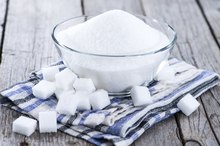Stevia and Cancer
Stevia leaf extract is a zero-calorie sweetener derived from the stevia plant 1. It has been used as a sweetener in South America for hundreds of years, according to a paper published in May 2015 in Nutrition Today. Early studies show that stevia extract may have a number of health benefits, including possible anti-cancer properties.
If you are experiencing serious medical symptoms, seek emergency treatment immediately.
While these early results are exciting but you should note that most of these studies have only been done in laboratory settings, not with human subjects.
Read more: Is Stevia Good For You?
Stevia As A Sweetener
The Food and Drug Administration considers stevia extract (steviol glycosides) as GRAS-- generally recognized as safe 2. However, stevia extract is 200 to 400 times sweeter than regular table sugar. This may lead people to find naturally sweet, healthy foods like fruits and vegetables less sweet and therefore less appealing, according to Harvard Medical School 3. As a result, people may opt for sweeter but more unhealthy foods instead.
However, if you're choosing between different zero-calorie sweeteners, it's better to choose stevia over a sweetener like Splenda 1. Splenda is even sweeter tasting than stevia and is made artificially, while stevia is naturally derived from plants.
Zero-calorie sweeteners like stevia are often touted as being a good tool to lose weight or to control blood sugars. The Memorial Sloan Kettering Cancer Center says stevia products have increased insulin sensitivity in animal studies-- a key part of managing diabetes 4. However, scientific information on stevia is still very unclear-- study results can be confusing and often contradictory.
A study published in December 2016 in Physiology & Behavior found that non-nutritive sweeteners are linked to an increased risk of obesity and type 2 diabetes. However, a study published in March 2017 in the International Journal of Obesity found that zero-calories sweeteners have very little effect on a person's daily food intake or their post-meal blood sugars.
Read more: Known Side Effects of Stevia
Additionally, non-sugar sweeteners, including stevia, may disrupt the gut microbiome, according to a review published in January 2019 in Advances in Nutrition 7. Researchers are just beginning to understand the critical role of the gut microbiome in human health. An imbalance in healthy gut bacteria may be linked to obesity, inflammatory bowel disease, and cancer, according to a study published in April 2015 in the International Journal of Molecular Science.
In short: much more research is needed to understand the dietary effects of stevia sweeteners. If you're concerned about the possible link between artificial sweeteners, the gut microbiome, and cancer, note that the American Cancer Society does not consider artificial sweeteners to be a cancer risk and that they are safe to eat in moderation 79.
Read more: How to Bake with Stevia Instead of Sugar
- The Food and Drug Administration.
- Read more: Known Side Effects of Stevia Additionally, non-sugar sweeteners, including stevia, may disrupt the gut microbiome, according to a review published in January 2019 in Advances in Nutrition.
- In short: much more research is needed to understand the dietary effects of stevia sweeteners.
Anti-Cancer Potential
Stevia Leaf Powder Vs. Leaf Extract
Learn More
As mentioned, stevia is still poorly understood. But it may have some surprising benefits when it comes to treating cancer.
A study published in May 2018 in Oncotarget found that steviol strongly limited the growth of human gastrointestinal cancer cells 10. The study suggests that steviol could potentially act as a chemotherapy treatment.
Corey Tolbert, a dietitian with Thomas F. Chapman Family Cancer Wellness at Piedmont Fayette Hospital spoke with LIVESTRONG.com the potential anti-cancer properties of stevia. "Some research studies have found that steviol glycoside derivatives had a toxic impact on cancer cells in leukemia, breast, lung, and stomach cancer. [It may also] have anti-inflammatory effects," says Tolbert. But Tolbert notes that much more human research is needed to determine if stevia has any cancer benefits. "Stevia should not be ingested solely for it's anti-cancer properties until further research is performed," says Tolbert.
- As mentioned, stevia is still poorly understood.
- But Tolbert notes that much more human research is needed to determine if stevia has any cancer benefits. "
Related Articles
References
- Nutrition Today: "Stevia, Nature’s Zero-Calorie Sustainable Sweetener"
- FDA: "Additional Information about High-Intensity Sweeteners Permitted for Use in Food in the United States"
- Harvard Medical School: "Artificial Sweeteners: Sugar-Free, But at What Cost?"
- Memorial Sloan Kettering Cancer Center: "Stevia"
- Physiology & Behavior: "Metabolic Effects of Non-Nutritive Sweeteners"
- International Journal of Obesity: "Effects of Aspartame-, Monk Fruit-, Stevia- and Sucrose-Sweetened Beverages on Postprandial Glucose, Insulin and Energy Intake"
- Advances in Nutrition: "Effects of Sweeteners on the Gut Microbiota"
- International Journal of Molecular Science: "Impacts of Gut Bacteria on Human Health and Diseases"
- American Cancer Society: "Common Questions About Diet and Cancer"
- Oncotarget: "Steviol, a Natural Product Inhibits Proliferation of the Gastrointestinal Cancer Cells Intensively"
- Goyal, S. K., & Goyal, R. K. (2010). Stevia (Stevia rebaudiana) a bio-sweetener: a review. International Journal of Food Sciences and Nutrition.
- Geuns, J. M. (2002). Safety evaluation of Stevia and stevioside. Studies in natural products chemistry, 27, 299-319.
- Lemus-Mondaca, R., Vega-Gálvez, A., Zura-Bravo, L., & Ah-Hen, K. (2012). Stevia rebaudiana Bertoni, source of a high-potency natural sweetener: A comprehensive review on the biochemical, nutritional and functional aspects. Food Chemistry, 132(3), 1121-1132.
- Sharma, N., Mogra, R., & Upadhyay, B. (2009). Effect of stevia extract intervention on lipid profile. Studies on Ethno-Medicine, 3(2), 137-140.
- Thomas, J. E., & Glade, M. J. (2010). Stevia: it's not just about calories. Benefits, 35, 36.
- Rogers, P. J., Hogenkamp, P. S., De Graaf, C., Higgs, S., Lluch, A., Ness, A. R., ... & Mela, D. J. (2016). Does low-energy sweetener consumption affect energy intake and body weight? A systematic review, including meta-analyses, of the evidence from human and animal studies. International Journal of Obesity (2005), 40(3), 381.
Writer Bio
Jeffery Herman has been writing in science since 2003. He has published several scientific abstracts for the American Association for Cancer Research and has also published articles in the "International Journal of Oncology." His scientific research focuses on alternative dietary therapies for cancer treatment. He holds a Ph.D. in pharmacology and toxicology from Washington State University.









